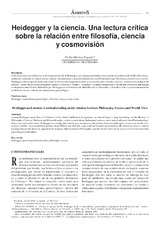Heidegger y la ciencia. Una lectura crítica sobre la relación entre filosofía, ciencia y cosmovisión
Heidegger and science. A critical reading on the relation between Philosophy, Science and World-View
Autor
Mantas España, Pedro
Editor
Asociación de Estudios de Ciencias Sociales y HumanidadesFecha
2010Materia
Heidegger, Martin, 1889-1976Materialismo gnoseológico
Filosofía
Ciencia
Cosmovisión
Gnoseological materialism
Philosophy
Science
METS:
Mostrar el registro METSPREMIS:
Mostrar el registro PREMISMetadatos
Mostrar el registro completo del ítemResumen
Entre otras líneas de influencia, en la formación inicial de Heidegger convergen un profundo conocimiento de la historia de la filosofía clásica, medieval y moderna, un interés por las ciencias fundamentales y una radical inmersión en la Fenomenología. Desde muy al inicio de su carrera, Heidegger estuvo especialmente interesado en ofrecer una respuesta en torno a la relación entre filosofía, ciencia y cosmovisión, tratando de esbozar –desde una posición divergente respecto a Husserl y Dilthey– su propia y original interpretación. El artículo desarrolla una lectura contrapuesta entre las tesis defendidas por Heidegger en su Seminario de «Introducción a la filosofía» y el análisis crítico que recientemente ha recibido desde una vertiente del materialismo gnoseológico. Among Heidegger main lines of influence on his initial intellectual background, we should quote a deep knowledge on the History of Philosophy –Classical, Medieval and Modern thought–, a clear concern about fundamental sciences, and a radical influence from Phenomenology. Since very early in his career, Heidegger was deeply interested to give an answer on the relation between philosophy, science and world-view, trying to outline –in an equidistant position from Dilthey and Husserl– a personal and original interpretation. My article develops a contrast reading between the thesis he support in his Seminar «Introduction to Philosophy» and the recent critics he has received from the side of the gnoseological materialism.

